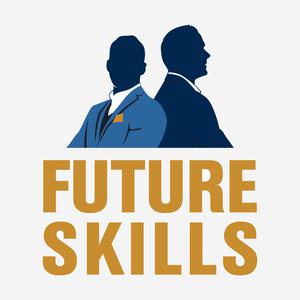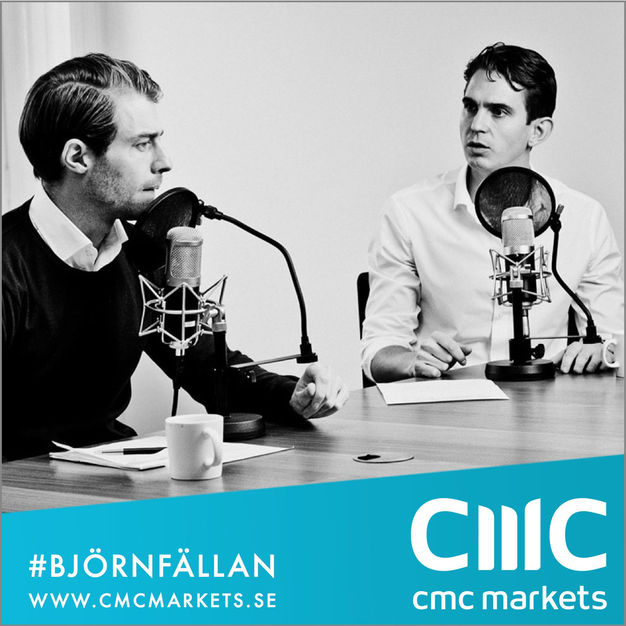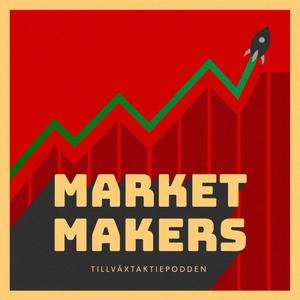
Future Skills
Mikael Syding & Ludvig Sunstrom
Future Skills
- 1 hour 39 minutesMartin Sandquist
Martin Sandquist co-founded Lynx asset management, a 8 billion dollar hedge fund
Do you want to learn more about investing? Check out https://theinvestingcourse.com/
5 September 2023, 9:52 am - 1 hour 12 minutesPippa Malmgren
Pippa Malmgren, award-winning author, former US Presidential Advisor and tech entrepreneur
Do you want to learn more about investing, timeless value investing methods? Check out https://theinvestingcourse.com/
5 September 2023, 9:51 am - 1 hour 1 minute47: Season 1 Finale – Synopsis of Lessons from our 15 Guests
We conclude Season 1 of Future Skills with an extra-long discussion about the top tips and ideas we learned from the following 15 guests:
Even if you’ve listened to all their episodes, the Season Finale will provide some much-needed spaced repetition and nuance on those ideas.
Do you want to learn more about investing? Check out https://theinvestingcourse.com/
Reading recommendations:
*Read a written season summary on Ludvig’s blog.
*Find a list of all Future Skills episodes + descriptions on the podcast website.
If you're on our newsletter, you will receive written of this episode following shortly.
=============
If you enjoyed our season finale:
*Subscribe to Future Skills on:
iTunes | Android | Stitcher | Spotify | Soundcloud
*Join our newsletter for weekly summaries of the episodes.
*Apply for the Future Skills Program
Email us at [email protected]
*Rate us on iTunes. It will help more people find us and prepare properly.
And stay tuned for Season 2.
6 January 2019, 9:32 pm - 1 hour 3 minutes46: Gold and Tesla Beyond The Blockchain with Erik Townsend
In today’s episode we pick up the talk from episode 34 with investor, author, podcast showrunner and technology entrepreneur Erik Townsend.
Once again we cover a lot of ground, including Erik's views on decision making & strategy, technological progress such as automation, and his current views on gold, oil and Tesla. We also talked about the process of writing and publishing his book "Beyond Blockchain"
Not least we talked about Erik's views on cryptocurrencies and what could come after Bitcoin.
=====
Do you want to learn more about investing? Check out https://theinvestingcourse.com/
In this episode you'll learn:
- That writing a book is easier than many claim
- But publishing and selling in large numbers is a special game of its own
- Why a global distributed ledger digital but gold backed currency is the logical development beyond the blockchain
- Why Tesla is still a zero
- When the USD could lose its reserve status
- Why and when the price of gold in USD could drop by 25 per cent or surge by 500 per cent
=====
Erik Townsend is a retired software entrepreneur turned hedge fund manager and host of the Macrovoices Podcast.
Throughout his career, Erik has capitalized on his ability to understand complex systems and anticipate paradigm shifts far in advance of the mainstream.
A teenage computer protégé, he spent most of his high school years at MIT's Artificial Intelligence laboratory, where he taught himself several computer programming languages. Erik became an independent software development and design consultant to Digital Corporation's manufacturing systems technology group at age 17. By age 20 he owned his first private aircraft.
=====
*Subscribe to Future Skills on: iTunes | Android | Stitcher | Spotify
*Join our newsletter for weekly summaries of the episodes.
31 December 2018, 8:35 am - 58 minutes 31 seconds45: Futurist Martin Ford on: the 23 Leading Architects of AI
❄ Merry Christmas! ❄
In today's Christmas episode we talk to futurist Martin Ford, popular speaker and author of bestselling books Rise of Robots and now Architects of Intelligence.
Do you want to learn more about investing? Check out https://theinvestingcourse.com/
This episode can be seen as the finale to the last three (#43 - robotics and #44 - global problems). We discuss where the future of AI, robotics, and other high-tech fields seems to be headed, based on the existing research and the lay of the land. Most important - Martin clarifies what might be reasonable to expect in terms of future progress in these areas, based on what he's learned from talking to the 23 leading innovators in these fields.
Here's a rough outline of the conversation:
- What is a robot? Martin's definition.
- Is Martin positive or pessimist about the future in general? Will the job market be more or less mismatched in 10 years?
- The Protestant Work Ethic is now mismatched to highly technological economy; how can we shift this value/tradition?
- Universal basic income - could it work? Is it compatible with open borders?
- What did Martin Learn from the 23 Architects of Intelligence? (Demis Hassabis, Nick Boström, Ray Kurzweil, Geoffrey Hinton, etc)
- What's an evolutionary network vs neural network?
- The leading AI companies - what are they up to?
- Why bundling & leveraging existing technology in business model will be paramount.
- Can normal people invest in AI startups?
- Longevity escape velocity - and will Ray Kurzweil live forever?
- Deep Mind + will Google achieve AI monopoly?
- What are some Future Skills recommended by Martin?
- And much more...!
More about Martin:
=============
If you enjoyed this conversation:
*Subscribe to Future Skills on:
|
. It will help more people find us and prepare properly.
24 December 2018, 4:57 am - 24 minutes 30 seconds44: The 5 Global Problems and 5 Big Technologies
We discuss 5 global problems (water, food, climate, energy, health and 5 big technologies that may be used in solving them (AI, automation, biotech, nanotech, 3D printing/additive manufacturing).
We call this the 5x5 Matrix: Click for image (if it doesn't show below).
Do you want to learn more about investing? Check out https://theinvestingcourse.com/
3 more problems are discussed: Education, depression, and migration.
We also discuss a list of future industries. Roughly 10 are mentioned out of a total list of 32. Subscribe to our newsletter for episode summaries for another 10 industries we did not get around to talking about in this episode.
=============
If you enjoyed this conversation:
*Subscribe to Future Skills on:
*
. It will help more people find us and prepare properly.
17 December 2018, 8:31 am - 22 minutes 58 seconds43: Why Robotics is the New Auto Industry
Alternate headline: "How You Can Own a Little Robot Butler, Like Rocky in 1984"
We delve into Mikael's strong interest for robotics and automation. Mikael makes a strong case for why robotics will be "the new auto industry", with lots of other industries converging into one massive industry. And how YOU can position yourself to get in early, working for or with robotics makers (for example by visiting your local robotics company...)
Do you want to learn more about investing? Check out https://theinvestingcourse.com/
Also discussed in this episode: "RaAS" - Robotics as a Service, "Intelligent Agents" - autonomous decision makers,
We will continue this discussion in next week's episode, talking about the 5 biggest problems to come (human demand) and the most likely (profitable) future industries.
Join our newsletter for episode summaries and said bonuses.
=============
If you enjoyed this conversation:
*Subscribe to Future Skills on:
*
. It will help more people find us and prepare properly.
10 December 2018, 1:19 am - 1 hour 12 minutes42: Dr Philippa Malmgren. How to manage the next big thing (Dr P is a robot entrepreneur, presidential advisor, author...)
Today we talk to Dr Philippa Malmgren
Pippa, short for “Philippa”, is a tech entrepreneur and a geopolitical consult. She has authored several books, including “Signals”, and “Geopolitics for investors”.
Do you want to learn more about investing? Check out https://theinvestingcourse.com/
In this conversation we focus on her most recent book “Leadership Lab” and learn about important neglected skills of good leaders and why managers keep getting blindsided by well-known trends.
We talk about important megatrends like Big Data and the internet of (surveillance) things and how to adapt to technological change.
Pippa is extremely productive, something she attributes to mostly working at just 80% of capacity.
Among many thought provoking ideas, we discussed see-through clothes, why even Philippa Malmgren finds resistance to her suggestions, and why you should replace your ToDo list with a Be list.
Finally we get to know how Pippa does her best work while she appears to be sleeping in, why culture eats strategy for breakfast, and how eyes can’t see clearly if imagination is out of focus.
You can find Dr Pippa on her website, Twitter, or Amazon
=============
If you enjoyed this discussion:
*Subscribe to Future Skills on: iTunes | Android | Stitcher | Spotify
*Join our newsletter for weekly summaries of the episodes.
*Apply for the Future Skills Program
Email us at [email protected]
2 December 2018, 11:00 pm - 26 minutes 30 seconds41: Q&A Part II, investment scaling, struggles, motivation, knowledge integration
We answer questions from listeners and subscribers to our newsletter.
Do you want to learn more about investing? Check out https://theinvestingcourse.com/
The following questions are answered in the episode:
- What is the distinction between perseverance vs. bull-headedness?
- What websites do you often visit?
- What have you had to give up to get where you are today?
- What motivates you?
- What was the biggest factor that helped you being successful, other than yourself?
- How do you distinguish between superficial and actual knowledge; how do you know if you are really learning something?
- How do you integrate recently acquired abstract mental models from reading into your daily process?
- Should I pay down my mortgage or put away money for my daughter?
- What books do you recommend for getting started with investing?
- What trend or theory is most overhyped right now? What’s your best tips for not getting caught up in such hypes?
- In times of a bear market in bonds, does it still make sense to park some money in short term corporate bonds?
- Have you discussed neurolinguistic programming, NLP?
- How has podcasting impacted your lives? What possibilities have opened up and what have you learned from building a follower base?
- How do you best improve self-discipline?
- What areas in life make you struggle the most?
- Mikael, when you were at Futuris, what were the hardest parts of the job?
*Subscribe to Future Skills on: iTunes | Android | Stitcher | Spotify
*Join our newsletter for weekly summaries of the episodes
Email us at [email protected]
26 November 2018, 7:12 am - 41 minutes 50 seconds40: Seth Godin - On the Future of Marketing and Business
We talk to Seth Godin, who is a serial entrepreneur, author, and one of the world’s biggest experts on marketing.
Seth has written as many as 18 bestselling books. His writing is about the post-industrial revolution, the way ideas spread, marketing, leadership and how change happens. His new book is called This is Marketing.
Seth is also the founder of the altMBA and the Marketing Seminar—two very successful online workshops. And, he has one of the world’s most popular blogs.
Seth has had a really interesting career, and we discuss some of his different business projects, like the Worlds of Power (a book series that sold over a million copies), and we also hear what it was like to work with Isaac Asimov.
Do you want to learn more about investing? Check out https://theinvestingcourse.com/
Three big takeaways from this conversation are:
1) You should start a blog. Even if it’s anonymous. Because it’s a great creative medium, and everyone should be engaged in some kind of creative medium as a long-term investment into their career and personal development.
2) All major industries become rebundled—that is, they become changed from the ground up— about every 10 to 20 years.
And finally:
3) Marketing is about creating stories that spread and drive change.
So, if you’re in business or you’re an entrepreneur or you have a message—the way to become more successful is to become better at marketing. And Seth says that the most important thing is learning to tell the right stories. And so—how do you do this? This is what Seth will explain in this conversation.
If you enjoyed this conversation:
*Subscribe to Future Skills on: iTunes | Android | Stitcher | Spotify | Soundcloud
*Join our newsletter for weekly summaries of the episodes.
*Apply for the Future Skills Program
*Email us at [email protected]
*Join the Future Skills Community
18 November 2018, 11:06 pm - 59 minutes 18 seconds39: Tyler Cowen - Economist and Master Generalist on: Economic Outlook, Social Change, and Future Cities
Tyler Cowen is an American economist, academic, and writer. He is the author of books like The Great Stagnation, Average is Over, The Complacent Class, and more.
Do you want to learn more about investing? Check out https://theinvestingcourse.com/
He occupies the Holbert L. Harris Chair of economics, as a professor at George Mason University, and is co-author, with Alex Tabarrok, of the popular economics blog Marginal Revolution. Cowen and Tabarrok have also ventured into online education by starting Marginal Revolution University. He currently writes a regular column for Bloomberg View. He also has written for such publications as The New York Times, The Wall Street Journal, Forbes, Time, Wired, Newsweek, and the Wilson Quarterly. Cowen also serves as faculty director of George Mason's Mercatus Center, a university research center that focuses on the market economy. In February 2011, Cowen received a nomination as one of the most influential economists in the last decade in a survey by The Economist. He was ranked #72 among the "Top 100 Global Thinkers" in 2011 by Foreign Policy Magazine "for finding markets in everything."
His newest book (subject of conversation today) is Stubborn Attachments. It took him almost 20 years to write it.
A few practical tips by Tyler: You should re-read the best books; you should have hobbies that make you think more, and you should argue for what you think is correct, but also understand it’s likely that you’re wrong.
Then we talk about big picture things, like:
- What is Tyler’s view of economic growth and how it happens?
- Have we seen the majority of economic growth from the Internet, or is most of it yet to come?
- What are the 2 things we—as a society—should prioritize above all else. And also: When should we prioritize economic growth over the redistribution of wealth by government?
- What are the 3 things scarce in today’s economy?
- How will future cities look different in 20-30 years from now?
- And, will the future economy reward generalists or specialists?
Learn more about Tyler:
- On Twitter
- Marginal Revolution (economic website)
- Conversations with Tyler (podcast)
- Tyler Cowen’s Ethnic Dining Guide
- Amazon Page
=============
If you enjoyed this discussion:
*Subscribe to Future Skills on: iTunes | Android | Stitcher | Spotify
*Join our newsletter for weekly summaries of the episodes.
*Apply for the Future Skills Program
Email us at [email protected]
12 November 2018, 5:15 am - More Episodes? Get the App
Your feedback is valuable to us. Should you encounter any bugs, glitches, lack of functionality or other problems, please email us on [email protected] or join Moon.FM Telegram Group where you can talk directly to the dev team who are happy to answer any queries.
 25 minuter
25 minuter
 Björnfällan
Björnfällan
 Omvärldspodden från Carnegie Private Banking
Omvärldspodden från Carnegie Private Banking
 Market Makers
Market Makers
 Outsiders
Outsiders
 Fondpodden
Fondpodden